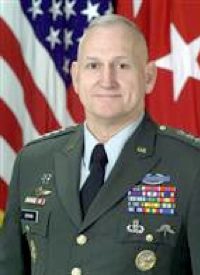
Pressure from a military veterans group unhappy with his stance on Islam and the 2001 terrorist attacks on the United States has prompted retired Army Lieutenant General William G. “Jerry” Boykin (left) to cancel his appearance as a speaker at West Point’s upcoming prayer breakfast February 8.
After discovering that Boykin, a noted terrorism expert and Christian speaker, had been asked to address cadets at the military academy, the liberal VoteVets.org teamed up with two like-minded groups, the Council on American-Islamic Relations and the secularist Military Religious Freedom Foundation, to pressure the Army’s Chief of Staff, General Ray Odierno, to dis-invite Boykin from the event.
The groups made their move after West Point’s superintendent, Lieutenant General David Huntoon, refused to bow to their pressure, telling them that the invitation to Boykin would stand. In a letter to Odierno, VoteVets officers Jon Soltz and Richard Smith called Huntoon’s refusal to obey them “unconscionable.”
What was their beef with Boykin? Following the 2001 terrorist attack in New York City, Boykin, a former intelligence officer and an original member of the Delta Force, had declared in various talks before churches that the conflict in which the nation found itself was, ultimately, a fight against Satan and the powers of darkness. While Boykin later apologized to enraged Muslim-Americans who accused him of insulting their faith, the VoteVets group nonetheless decided the comments outweighed Boykin’s exemplary record of military leadership and that he was not qualified to speak to the future officers.
In their letter to Odierno, Soltz and Smith accused Boykin of making “extremist and hateful” remarks toward Islam, arguing that his values are “incompatible with the Army values, and a person who is incompatible with Army values should not address the cadets of the United States Military Academy.”
“As Veterans of these wars [in Iraq and Afghanistan] and men who have served in combat alongside Muslim Americans,” the veterans duo concluded, “we respectfully request that you retract LTG Boykin’s invite to the USMA Prayer Breakfast.”
While telling Odierno that “we have the utmost faith in your leadership,” Soltz and Smith emphasized in a VoteVet press release that, if the Army Chief of Staff failed to follow their orders, they would sidestep his decision and take their request all the way to the military’s Commander-in-Chief.
With pressure mounting on West Point and his military colleagues, General Boykin gracefully bowed out of the conflict, announcing that he had decided to cancel his address at the academy. “It became very obvious that the stress on West Point was getting out of control to the point that it was being a distraction for them,” Boykin told OneNewsNow.com. “I withdrew from the event, realizing that it had become so overpowering for them that quite frankly they couldn’t deal with the continued pressure from these organizations….”
Boykin said that the address he had planned for the West Point cadets was not centered on Islam, terrorism, or other issues for which he was criticized in the past. “I was asked to come up and share with these students and some of the faculty there the importance of faith,” he told OneNewsNow. “It was ecumenical. There were going to be Christians, Muslims, and Jews and potentially other faiths integrated into this, so it had nothing to do with Islam. But their opposition was not to the message — it was to me.”
In an op-ed on HuffingtonPost.com defending Boykin, the Family Research Council’s Ken Blackwell and Ken Klukowski likened the retired general to an “action-movie hero,” recalling that when the elite Army Delta Force was formed in the 1970s, Boykin was chosen to be part of it. “In 1983 he was in Grenada, where Boykin survived being hit by a round from a .50-caliber gun,” the FRC activists recalled, noting that a single round from the weapon has the force to split a person in two. “In 1992 and ’93, he was part of the Delta Force team hunting (and unofficially killing) drug lord Pablo Escobar,” they continued. “Then in 1993, Boykin was the commanding officer of the mission in the Battle of Mogadishu in Somalia forever memorialized in the movie Black Hawk Down.”
Beyond his unarguable hero status, Boykin is also an outspoken Christian whose deep faith — despite any supposed ideological missteps he may have taken in the past — would provide an invaluable example to officers-in-training. But it is just this kind of faith and conviction that are out of place in an increasingly secularized military.
Blackwell and Klukowski pointed out that many of America’s military heroes past and present have been unashamed to declare their faith in God. “Many find their battlefield courage in their unshakeable belief that their sins are forgiven, their lives are in God’s hands, and that when they die they would go to an eternal reward,” they wrote, adding: “Sounds like the kind of people you want at a prayer breakfast for those who may soon land on one of those battlefields.”


